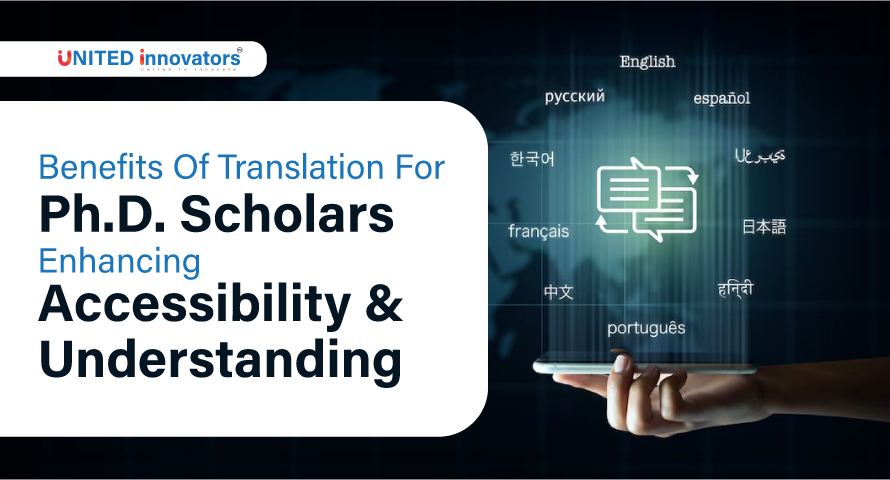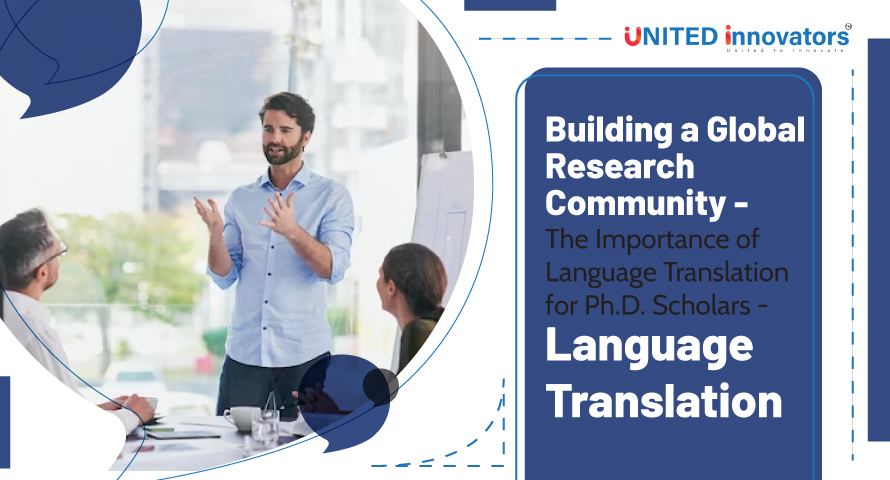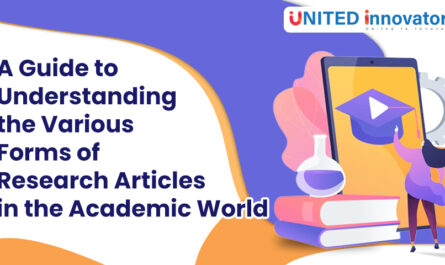The Intersection Of Language & Research
The language we use is much more than a mere communication tool. It shapes our perceptions, structures our thoughts, and facilitates the sharing of knowledge. In the realm of research, language assumes an even more critical role, serving as the bedrock upon which new knowledge is built and disseminated. Delved into below is the intersection of language and research, highlighting its multifaceted influence on the research process and output.
● Language As A Tool For Constructing Knowledge
- At the heart of research is the construction of knowledge.
- Language, as a cognitive tool, is instrumental in this process.
- It aids in formulating research questions, hypothesizing, theorizing, and drawing conclusions.
- The nuanced use of language allows researchers to articulate complex ideas, dissect intricate phenomena, and build theoretical frameworks.
- Moreover, language guides the coding and categorization processes in qualitative research, shaping data interpretation and analysis.
● Language In Disseminating Research Findings
- Once research has been conducted, findings must be disseminated effectively, a task heavily reliant on language.
- In writing research papers, language precision is crucial to accurately convey findings, contextualize results, and outline methodologies.
- The terminology used needs to align with the specific discipline’s language, ensuring comprehension within the field.
- Furthermore, language choice determines the accessibility of research findings.
- English, for instance, has evolved as the lingua franca of research, contributing to the wider dissemination of English-language research.
- Conversely, valuable research conducted in less globally dominant languages may be overlooked, presenting a barrier to truly global knowledge exchange.
● The Role Of Language In Peer Review
- Language also plays a pivotal part in the peer review process, a fundamental quality control mechanism in research.
- Reviewers evaluate not only the content of a research paper but also its clarity and coherence, heavily influenced by language use.
- Researchers, therefore, must not only be experts in their respective fields but also skilled communicators in the language of their discourse.
● Language & Cross-Cultural Research Collaboration
- In an increasingly interconnected research landscape, language can either facilitate or hinder cross-cultural collaboration.
- Shared language fosters communication, mutual understanding, and knowledge exchange, facilitating collaborative research across borders.
- Conversely, language barriers may hinder such collaborations, posing a significant challenge in building a global research community.
The intersection of language and research is a dynamic and multifaceted one. Language serves as a cognitive tool for constructing knowledge, a medium for disseminating findings, a key factor in the peer review process, and a potential facilitator or barrier in cross-cultural collaboration. Understanding the profound influence of language on research is crucial, informing more effective research practices and promoting a more inclusive global research landscape.
- Language Barriers In Global Research – Challenges For Ph.D. Scholars
- The global research landscape is a vibrant tapestry of knowledge from diverse fields and cultures.
- However, this diversity can present challenges for Ph.D. scholars, particularly when language barriers impede communication, knowledge dissemination, and cross-cultural collaboration.
- Limitations In Accessing Global Knowledge
- The first major challenge posed by language barriers is the limitation it places on accessing global knowledge.
- Many research findings are published in English, often leaving non-native English speaking researchers at a disadvantage.
- They might struggle to comprehend complex theories, methodologies, or discussions, thereby missing out on essential knowledge within their field.
- Impediments In Publishing Research
- Secondly, language barriers can also create significant hurdles in publishing research.
- Non-native English-speaking researchers might find it challenging to write their research papers in English.
- This can result in difficulties in conveying their findings clearly and persuasively, which can ultimately affect their chances of getting published in reputable journals.
- Complications In Peer Review & Collaboration
- Language barriers can further complicate the peer review process and collaborative research efforts.
- Researchers with limited proficiency in the language of communication may struggle to provide effective feedback or participate fully in collaborative projects.
- These barriers can thus potentially limit their professional growth and opportunities for cross-cultural collaboration.
- Challenges Associated With Participating In Conferences & Seminars
- International conferences and seminars are key venues for sharing ideas, networking, and staying abreast of advancements in one’s field.
- However, these events are often conducted in English or other dominant languages, making it challenging for some researchers to participate actively and gain maximum benefit from these forums.
- Struggles In Securing Funding
- Language barriers may also impede researchers in securing funding.
- Grant applications often require complex and persuasive language to demonstrate the value and feasibility of the proposed research.
- Non-native speakers may struggle to articulate their proposals compellingly, potentially limiting their access to funding opportunities.
- Language barriers in global research present significant challenges for Ph.D. scholars, particularly those for whom English or other dominant research languages are not their first language.
- These challenges underscore the need for supportive mechanisms, such as translation services, language training, and more inclusive publishing practices.
- Addressing language barriers is vital to ensuring that all researchers, regardless of their language proficiency, can contribute to and benefit from the global research community.
The Role Of Language Translation In Facilitating Research

- Language is an integral part of research, shaping the processes of knowledge creation, dissemination, and exchange.
- However, language barriers can hinder these processes, especially in a global research landscape characterized by diverse linguistic backgrounds.
- Herein lies the critical role of language translation, serving as a powerful tool to bridge linguistic gaps and facilitate research.
- Facilitating Access To Global Knowledge
- The vast array of knowledge created by researchers worldwide is encapsulated in a variety of languages.
- Language translation plays a pivotal role in granting researchers access to this global pool of knowledge.
- By translating research findings, theories, and methodologies into different languages, it broadens the accessibility of knowledge, promoting a more inclusive research community.
- Enabling Dissemination Of Research Findings
- Language translation also enables researchers to disseminate their work to a broader audience.
- By translating their research papers into other languages, they can reach beyond their local or national contexts, contributing to the global conversation in their field.
- This can increase the visibility and impact of their research, bringing recognition and opportunities for collaboration.
- Empowering Cross-Cultural Collaboration
- Language translation empowers cross-cultural research collaboration by enabling effective communication and understanding among researchers of different linguistic backgrounds.
- By providing translations of project proposals, research findings, and collaborative documents, it facilitates the sharing of ideas, feedback, and insights, driving innovative and globally relevant research outcomes.
- Enhancing Participation In International Conferences
- Translation services at international research conferences and seminars enable non-native speakers to participate fully, presenting their work and engaging in discussions.
- Simultaneous translation can ensure that language barriers do not exclude researchers from contributing to and benefiting from these vital forums for knowledge exchange.
- Facilitating Peer Review
- Language translation can also facilitate the peer review process, ensuring it is not limited by linguistic boundaries.
- By translating research papers for review, it allows researchers to provide feedback on work outside their language proficiency, enhancing the diversity and inclusivity of the review process.
- The role of language translation in facilitating research is multifaceted and profound.
- It empowers researchers to access global knowledge, disseminate their findings, engage in cross-cultural collaboration, participate in international forums, and contribute to the peer review process.
- As such, language translation is not only a tool for overcoming language barriers but also a catalyst for the creation and exchange of knowledge in the global research community.
Benefits Of Translation For Ph.D. Scholars – Enhancing Accessibility & Understanding

- Translation is a powerful tool for Ph.D. scholars, especially in the dynamic and global world of research.
- It can open up new vistas of knowledge, offer broader dissemination of research findings, and foster international collaborations.
- Explained below are the benefits of translation for Ph.D. scholars, particularly how it enhances accessibility and understanding in their academic journey.
- Accessing Global Research
- Research does not exist in a vacuum; it is a continuous conversation with scholars adding to, critiquing, and building upon previous work.
- Translation facilitates access to this conversation, allowing Ph.D. scholars to explore research not only in their native language but also in languages they may not understand.
- This broadens their knowledge base and offers new perspectives, enhancing the depth and breadth of their own research.
- Enhancing Dissemination & Reach
- Translation can enhance the reach of a scholar’s research, enabling it to transcend linguistic boundaries.
- This can attract a wider audience, increase citations, and elevate the overall impact of their research.
- It opens up opportunities for their work to be recognized and referenced by scholars worldwide, enriching the global scientific discourse.
- Fostering International Collaborations
- A significant advantage of translation is the facilitation of international research collaborations.
- By overcoming language barriers, scholars can work with diverse research teams, contributing their expertise and benefiting from others’.
- This cross-pollination of ideas can lead to groundbreaking research that addresses global challenges.
- Enriching Conference Participation
- For Ph.D. scholars, conferences are valuable venues for presenting research, networking, and learning about the latest developments in their field.
- Translation services at these events ensure that scholars can actively participate, regardless of the conference language.
- This enhances their professional development and opens up potential collaborative opportunities.
- Facilitating Funding Opportunities
- Many funding bodies are international, and their applications may require a different language than the scholar’s native one.
- Translated applications can increase chances of success, enabling scholars to secure funding for their research.
- The benefits of translation for Ph.D. scholars are transformative.
- It acts as a key that unlocks global knowledge, broadens research dissemination, fosters international collaborations, enriches conference participation, and facilitates funding opportunities.
- As the academic world becomes more interconnected, translation will continue to play an integral part in shaping the Ph.D. journey, enhancing both accessibility and understanding.
- Translation & The Dissemination Of Research Findings
- In the vast world of academic research, the dissemination of findings is as vital as the research process itself.
- An essential component of this dissemination process is translation. It allows research to cross linguistic barriers, reaching a wider, more diverse audience, and enriching the global knowledge pool.
- Bridging The Language Gap In Research Publication
- Translation facilitates the publication of research findings in various languages, helping to bridge the language gap.
- Non-English speaking researchers can access work published in English, and vice versa, democratizing access to knowledge.
- This not only broadens the reach of research findings but also fosters a more inclusive academic environment.
- Enhancing Research Impact
- By making it possible for research to reach a wider audience, translation inherently enhances its impact.
- A larger readership means more chances for citation, greater recognition, and potential for real-world application.
- As such, translation can significantly contribute to the recognition and influence of researchers and their work.
- Fostering Global Collaboration & Dialogue
- Translation fosters collaboration and dialogue among researchers worldwide.
- By making research findings accessible in multiple languages, translation allows for the sharing and exchange of ideas across linguistic boundaries.
- This can spark international collaborations, foster cross-cultural academic dialogue, and drive innovation in research.
- Navigating Multilingual Conferences
- In the context of international academic conferences, translation ensures the broad dissemination of presented research.
- Simultaneous translation services allow presenters to share their findings with all attendees, regardless of language proficiency.
- This promotes understanding and engagement, amplifying the reach and impact of the research presented.
- Contributing To Policy & Practice
- Translation of research findings can significantly influence policy and practice at a global level.
- Research that has been translated into multiple languages is more readily accessible to policymakers and practitioners around the world.
- This makes it more likely that research findings will be incorporated into policy decisions and practical applications, contributing to societal change.
- Translation is a pivotal element in the dissemination of research findings, serving as a bridge that connects researchers and audiences worldwide.
- By fostering inclusivity, enhancing research impact, facilitating global collaboration, aiding in conference participation, and influencing policy and practice, translation is an indispensable tool in the global academic landscape.
- Its value extends far beyond linguistic conversion, contributing to the overall advancement of global research and knowledge exchange.
- Language Translation As A Tool For Collaboration In The Global Research Community
- As the world grows increasingly interconnected, the importance of collaboration in the global research community cannot be understated.
- The key to such fruitful collaboration often lies in overcoming language barriers, with language translation serving as an invaluable tool.
- Overcoming Linguistic Hurdles In Research Collaboration
- The first step to effective collaboration is clear communication.
- However, the diversity of languages spoken in the global research community often presents a challenge.
- This is where translation comes in, overcoming linguistic hurdles and allowing researchers to share ideas, data, and findings seamlessly.
- Enhancing Cross-Cultural Understanding
- Translation does more than just convert text from one language to another; it bridges cultural gaps.
- Understanding the nuances and context of different languages can help researchers gain a deeper appreciation of each other’s perspectives, enriching collaborative endeavors.
- Facilitating Multinational Research Projects
- Multinational research projects are often complex due to the various languages spoken by participating researchers.
- By translating research materials, proposals, and findings, these projects become more manageable and productive, fostering successful multinational collaboration.
- Boosting Participation In International Conferences
- International academic conferences provide a platform for researchers to learn, network, and collaborate.
- Translation services at these events enable all participants, regardless of their language proficiency, to engage effectively, boosting opportunities for global collaboration.
- Promoting Global Visibility & Impact Of Research
- Translation can amplify the reach of research findings, making them accessible to a broader global audience.
- This increased visibility can attract interest from researchers worldwide, paving the way for further collaborative work and enhancing the overall impact of the research.
- Enabling Policy Influence Across Borders
- Research findings, when translated, can influence policies beyond the borders of the researchers’ home countries.
- This global influence can lead to cross-country collaborations aimed at addressing common policy issues, demonstrating the power of translation in fostering global change.
- Language translation plays a significant role in catalyzing collaboration within the global research community.
- By overcoming linguistic barriers, enhancing cross-cultural understanding, facilitating multinational projects, promoting global visibility of research, and enabling policy influence, translation proves to be an indispensable tool.
- As we continue to navigate the complexities of the global research landscape, the role of translation as a collaborative tool is poised to grow even more integral.
● The Future Of Research – Overcoming Language Barriers With Translation Technology
- Language barriers have long posed challenges to the flow of knowledge and ideas in research.
- However, the advent of translation technology has brought about a revolution, potentially redefining the future of research by bridging these linguistic gaps.
○ The Evolution Of Translation Technology
- The development of translation technology has been transformative.
- From early days of simple word-for-word translations to today’s sophisticated AI-powered platforms that can capture nuances and context, we have come a long way.
- These advancements are playing an increasing role in global research, fostering improved communication and understanding among researchers from diverse linguistic backgrounds.
○ Machine Translation In Research Dissemination
- Machine translation platforms, including but not limited to Google Translate and DeepL, provide instant translations of vast bodies of text.
- These tools can rapidly translate research papers, enabling immediate access to research findings across the global community.
- This has opened the floodgates of knowledge, allowing researchers to access and build upon work from all corners of the globe.
○ Neural Machine Translation – A Game Changer
- A significant breakthrough in translation technology is Neural Machine Translation (NMT).
- NMT uses deep learning algorithms to understand context, semantic meaning, and even cultural nuances.
- With its enhanced translation capabilities, NMT can revolutionize research dissemination and collaboration by providing more accurate and contextually appropriate translations.
○ Translation Technology & Open Access
- Translation technology, when coupled with open-access policies, can exponentially increase the reach of research.
- Open access research, freely available to all, when translated into multiple languages, paves the way for universal access to knowledge, enabling a truly global research community.
○ Challenges & Considerations
- Despite the enormous potential of translation technology, it’s essential to acknowledge its limitations.
- Machine translations may lack precision and fail to convey subtle nuances or complex technical terminology accurately.
- Human oversight, therefore, remains indispensable.
- Additionally, ethical considerations, particularly around copyright and attribution, must also be addressed.
- The future of research lies in its ability to transcend linguistic barriers and foster global collaboration.
- Translation technology, with its capacity to rapidly and accurately convert text into multiple languages, is poised to be a significant catalyst in this process.
- While challenges and ethical considerations persist, the potential of such technology to democratize access to knowledge and promote international collaboration is undeniably transformative.
- As we progress, we can look forward to a future where language is no longer a barrier but a bridge to global knowledge exchange.
- Building A Truly Global Research Community Through Language Translation
- As the scope of research becomes increasingly global, the necessity of overcoming language barriers to foster inclusivity and collaboration becomes paramount.
- Language translation serves as a bridge, uniting researchers across linguistic boundaries and paving the way for a truly global research community.
- This article delves into the transformative role of language translation in achieving this vision.
- The Concept Of A Global Research Community
- A global research community is characterized by seamless collaboration and knowledge exchange among researchers worldwide, irrespective of their linguistic or cultural background.
- The primary challenge in realizing this vision is the diversity of languages, which can hinder effective communication and collaboration.
- The Power Of Language Translation
- Language translation, whether conducted by human translators or advanced technology, can break down linguistic barriers, making research findings accessible across linguistic boundaries.
- The power of translation lies not only in its ability to convey words but also ideas, theories, and research findings in a manner that can be understood and built upon by researchers around the globe.
- Facilitating Multinational Collaboration
- By translating research materials, proposals, findings, and even communication among team members, language translation can significantly enhance the efficiency and productivity of multinational research projects.
- This ensures that language does not pose a hindrance to any researcher, regardless of their linguistic background.
- Encouraging Diversity In Research
- Language translation can foster greater diversity in research.
- It enables researchers from non-English speaking backgrounds to contribute their knowledge and insights, enriching the global research landscape with diverse perspectives.
- Enhancing Global Impact Of Research
- Through language translation, research findings can reach a global audience, thereby amplifying their impact.
- This not only enhances the visibility of the research but also paves the way for further collaboration and dialogue.
- The Role Of Technology
- Technology, particularly machine translation and AI, has revolutionized the speed and ease of translation, making it more accessible.
- With advancements in translation technology, we can expect a more integrated and inclusive global research community.
- Building a truly global research community calls for concerted efforts to eliminate linguistic barriers that can hinder effective collaboration and knowledge exchange.
- Language translation emerges as a potent tool in this endeavor, fostering inclusivity, enhancing the impact of research, and paving the way for a truly global research community.
- As technology continues to revolutionize the field of translation, the dream of a borderless research community seems increasingly within our grasp.



